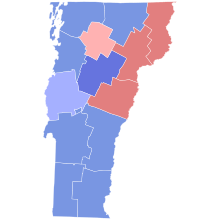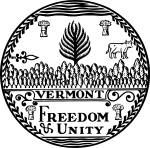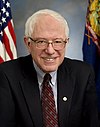
The Green Mountain Peace and Justice Party, known as the Liberty Union Party(LUP) until 2021, is a political party active in the U.S. state of Vermont. It is a self-proclaimed "non-violent socialist party".

The 2006 United States Senate election in Vermont was held November 7, 2006. Incumbent independent Senator Jim Jeffords decided to retire rather than seek reelection to a fourth term, and Bernie Sanders was elected to succeed him.

Peter Francis Welch is an American lawyer and politician serving since 2023 as the junior United States senator from Vermont. A member of the Democratic Party, he was U.S. representative for Vermont's at-large congressional district from 2007 to 2023. He has been a major figure in Vermont politics for over four decades, and is only the second Democrat to be elected a senator from the state.
The politics of Vermont encompass the acts of the elected legislative bodies of the US state, the actions of its governors, as overseen by the Vermont courts, and the acts of the political parties that vie for elective power within the state. The state's politics include local Democratic and Republican political parties, as well as several smaller parties.

Elections in Vermont are authorized under Chapter II of the Vermont State Constitution, articles 43–49, which establishes elections for the state level officers, cabinet, and legislature. Articles 50–53 establish the election of county-level officers.

The 2012 United States Senate election in Vermont was held on November 6, 2012. Incumbent independent Senator Bernie Sanders won reelection to a second term in a landslide, defeating Republican nominee John MacGovern with 71% of the vote. Sanders, a self-described democratic socialist, was first elected with 65% of the vote in 2006, and was the first non-Republican to win this seat since 1850.

The 1990 United States House of Representatives election in Vermont was held on Tuesday, November 6, 1990 to elect the U.S. representative from the state's at-large congressional district. The election coincided with the elections of other federal and state offices.

Douglas R. Hoffer Jr. is an American policy analyst from Burlington, Vermont, who is currently serving as the Vermont State Auditor. He took office on January 10, 2013.
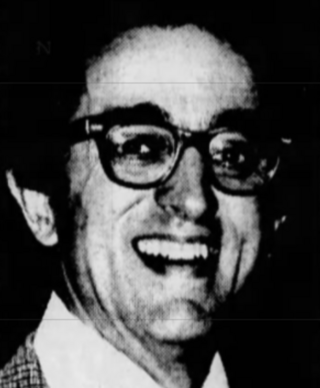
The 1978 Vermont gubernatorial election took place on November 7, 1978. Incumbent Republican Richard Snelling ran successfully for a second term as Governor of Vermont, defeating Democratic candidate Edwin Granai. As of 2014, this was the most recent Vermont gubernatorial election in which both major party candidates are now deceased.

The 1976 Vermont gubernatorial election took place on November 2, 1976. Incumbent Democrat Thomas P. Salmon did not seek another term as Governor of Vermont, instead running for United States Senate. Republican candidate Richard A. Snelling won the election, defeating Democratic candidate Stella B. Hackel and Liberty Union candidate Bernie Sanders.

The 1988 United States House of Representatives election in Vermont was held on November 8, 1988. Republican nominee Peter Plympton Smith defeated independent candidate Bernie Sanders and Democratic nominee Paul N. Poirier.

The 1992 United States House of Representatives election in Vermont was held on Tuesday, November 3, 1992 to elect the U.S. representative from the state's at-large congressional district. The election coincided with the elections of other federal and state offices, including a quadrennial presidential election and an election to the U.S. Senate.

The 1996 United States House of Representatives election in Vermont was held on Tuesday, November 5, 1996, to elect the U.S. representative from the state's at-large congressional district. The election coincided with the elections of other federal and state offices, including a quadrennial presidential election.
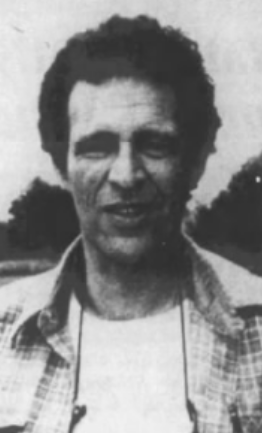
Peter Isaac Diamondstone was an American lawyer and socialist politician from the state of Vermont, best known as a perennial candidate and co-founder of the Liberty Union Party. He ran for various Vermont political offices, always unsuccessfully, in every election cycle from 1970 until 2016.

A general election was held in the U.S. state of Vermont on November 8, 2016. All of Vermont's executive officers were up for election as well as Vermont's Class III Senate seat and at-large seat in the United States House of Representatives. Primary elections were held on August 9, 2016.

United States gubernatorial elections were held on November 3, 2020, in 11 states and two territories. The previous gubernatorial elections for this group of states took place in 2016, except in New Hampshire and Vermont where governors only serve two-year terms. These two states elected their current governors in 2018. Nine state governors ran for reelection and all nine won, while Democrat Steve Bullock of Montana could not run again due to term limits and Republican Gary Herbert of Utah decided to retire at the end of his term.

United States gubernatorial elections were held on November 8, 2022, in 36 states and three territories. As most governors serve four-year terms, the last regular gubernatorial elections for all but two of the seats took place in 2018 U.S. gubernatorial elections. The gubernatorial elections took place concurrently with several other federal, state, and local elections, as part of the 2022 midterm elections.

A general election was held in the U.S. state of Vermont on November 6, 2018. All of Vermont's executive officers were up for election as well as Vermont's Class I Senate seat and at-large seat in the United States House of Representatives. Primary elections were held on August 14, 2018.

The 2020 Vermont gubernatorial election was held on November 3, 2020, to elect the Governor of Vermont. As Vermont does not impose term limits upon its governors, incumbent Republican Governor Phil Scott was eligible to run for reelection to a third two-year term in office. On November 18, 2019, he confirmed that he was running for reelection, but did not yet publicly announce his campaign. On May 28, 2020, he officially announced his candidacy but stated that he would not campaign, maintain a campaign staff, or fundraise because of the state of emergency due to the COVID-19 pandemic in Vermont. The primary was held on August 11. Scott won re-election to a third term in a landslide, defeating Progressive and Democratic nominee, Lieutenant Governor David Zuckerman.

The 1864 Vermont gubernatorial election for governor of Vermont took place on September 6. Incumbent J. Gregory Smith was a candidate for reelection to a second one-year term, in keeping with the provisions of the Republican Party's "Mountain Rule". The Democratic nominee was Timothy P. Redfield, a former member of the Vermont Senate, the Free Soil Party's 1851 nominee for governor, and the Democratic nominee in 1863. In the general election, the Republican Party's dominance of Vermont politics continued, and Smith was easily reelected.
